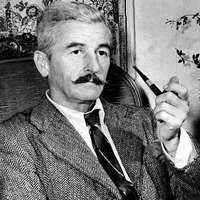A Rose for Emily
7 min read ⌚
 There are not many short stories better than William Faulkner’s “A Rose for Emily.”
There are not many short stories better than William Faulkner’s “A Rose for Emily.”
And we believe that even its summary shows why.
Read ahead! Or, even better, read the full story if you have some time.
Believe us: you won’t regret it!
Who Should Read “A Rose for Emily”? And Why?
Published in “The Forum” on April 30, 1930, “A Rose for Emily” was William Faulkner’s “first short story published in a national magazine.”
And what a first that was!
Fresh from writing one of the world’s most celebrated literary masterpieces – “The Sound and the Fury” – Faulkner here opted for a much more straightforward style, which, coupled with its brevity and status, makes “A Rose for Emily” the perfect place to start exploring the wonderful alternative universe of Faulkner.
There’s a little bit of everything here – pain, bizarreness, Southern Gothicism – which has made Faulkner famous.
There’s also something more: genuine grief and pathos.
William Faulkner Biography
 William Faulkner was an American novelist, short story writer, essayist and screenwriter, winner of the Nobel Prize in Literature in 1949.
William Faulkner was an American novelist, short story writer, essayist and screenwriter, winner of the Nobel Prize in Literature in 1949.
One of the greatest American prose writers in history never graduated from high school and started his career as a poet under the influence of A. E. Housman and A. C. Swinburne. Afterward, he moved to New Orleans and started writing the novels and short stories which will make him famous.
He won the National Book Award in 1951 for his “Collected Short Stories” and once again four years later for “A Fable,” a novel he considered “the best of [his] life and maybe of [his] time.” “A Fable” also won him his first Pulitzer Prize for Fiction, an award he will receive once again in 1963, posthumously, for “The Reivers.”
However, he is today most famous for his early works, “The Sound and the Fury,” “As I Lay Dying,” “Light in August” and “Absalom, Absalom!” all written in the decade before the Second World War.
Book Summary
Displaying an uncanny blend of the homely and the horrifying, “A Rose for Emily” reflects the deep love and loathing, the tenderness and contempt, the identification and repudiation William Faulkner has felt for the traditions and the way of life of his own portion of the world.
The Emily of the title of William Faulkner’s short story is already dead even before Faulkner begins his report – and we find out this in the very first sentence:
When Miss Emily Grierson died, our whole town went to her funeral: the men through a sort of respectful affection for a fallen monument, the women mostly out of curiosity to see the inside of her house, which no one save an old man-servant – a combined gardener and cook – had seen in at least ten years.
So, we already learn few important things about Emily:
1) that she is a “Miss” and that she is respected (or, at least, well-known) enough that the whole town goes to her funeral;
2) that, even so, nobody had seen the inside of her house for at least a decade;
3) that the only exception to this is an old man-servant who works both as a gardener and a cook for her.
Already feels like a mystery you want to solve, doesn’t it?
Well, let’s meander through Faulkner’s flashbacks and find out a couple of things more!
First, the reason why she is respected: she is a Grierson, and the Griersons – just like Chopin’s Valmondé and Aubigny families – were the pinnacle of the antebellum Southern society, its gentry and aristocracy.
However, after the Civil War, their fortune abruptly changed and she and her father remained the disfavored last two of this once great clan.
Her father made sure that this will remain so, forbidding his daughter to marry anyone below her status – which, at the time and in his eyes, is, basically, everyone.
When Emily is about 30 years old, her father suddenly dies, and this results in a longer grieving period, where Emily couldn’t stop thinking and start living. She refuses to give up her father’s corpse, as a reflection of her deep connection to her father.
Grief-stricken and desperate, Emily starts living an even more isolated life, her only connection with the outside world her servant Tobe and few students to whom she gives china-painting lessons.
After she stops doing that, Emily becomes much more of a burden for her town than an inhabitant of it. She is – Faulkner informs us – “a tradition, a duty, and a care; a sort of hereditary obligation upon the town.”
Hell, she’s not even paying taxes – courtesy of the town’s former mayor Colonel Sartoris, who, out of respect, had invented a tale that this was the town’s way of repaying Emily for the charity of her father!
It’s not like the new generation of mayors didn’t try to change this!
They even called a special meeting of the Board of Alderman and sent a delegation to her door.
This is what they saw:
…a small, fat woman in black, with a thin gold chain descending to her waist and vanishing into her belt, leaning on an ebony cane with a tarnished gold head. Her skeleton was small and spare; perhaps that was why what would have been merely plumpness in another was obesity in her. She looked bloated, like a body long submerged in motionless water, and of that pallid hue. Her eyes, lost in the fatty ridges of her face, looked like two small pieces of coal pressed into a lump of dough as they moved from one face to another while the visitors stated their errand.
And what they heard when they explained the case to Emily?
“See Colonel Sartoris. I have no taxes in Jefferson.”
However, at this point, a meeting with Colonel Sartoris would be nothing less than a paranormal event, since the guy had died ten years ago.
So, OK – says the community.
Leave Emily be.
But the problem is that Emily has been for a few decades now.
More than thirty years before the town folks came to ask her for the tax money – and just two years after her father’s death – a neighbor had complained to Judge Stephens that her house emits an unbearable stench.
So as to not disturb her – she’s Lady Emily, a Grierson! – the city council decides to send four men undercover to (wait for it!) sprinkle lime around her house!
The smell soon disappears.
Just like Emily who is basically never seen out of her house from then on.
Things could have been a lot different if she had married Homer Barron, a foreman for a road construction project, “a Yankee – a big, dark, ready man, with a big voice and eyes lighter than his face.”
However, the marriage was frowned upon by some of the townspeople (others approved it), and more importantly, it was considered blasphemy by Emily’s cousins, relatives living in Alabama.
How does Emily dare to marry a Northerner and a blue-collar?
So, Emily doesn’t.
What she does is something which makes the whole town fear about her well-being: she buys arsenic from the druggist.
And when Homer Barron suddenly disappears, everybody is waiting for the inevitable:
“She will kill herself,” everybody’s saying.
A Rose for Emily Epilogue
No, that’s not how Emily dies.
Much later, she falls ill in her house and with nobody but Tobe to care for her,
She died in one of the downstairs rooms, in a heavy walnut bed with a curtain, her gray head propped on a pillow yellow and moldy with age and lack of sunlight.
So, now comes the funeral.
As we said above, the whole town is there to give Emily a proper sendoff – though, much more, to see how desolate and bleak her house is.
As it is rumored in the town, one of Emily’s rooms – her upstairs bedroom – is locked. After she’s laid “decently in the ground,” few Jeffersonias decide to break it.
And inside –
A thin, acrid pall as of the tomb seemed to lie everywhere upon this room decked and furnished as for a bridal: upon the valance curtains of faded rose color, upon the rose-shaded lights, upon the dressing table, upon the delicate array of crystal and the man’s toilet things backed with tarnished silver, silver so tarnished that the monogram was obscured. Among them lay a collar and tie, as if they had just been removed, which, lifted, left upon the surface a pale crescent in the dust. Upon a chair hung the suit, carefully folded; beneath it the two mute shoes and the discarded socks.
The man himself lay in the bed.
You’ve guessed it: the man is none other but Homer Barron, 40 years dead and, it seems, like many, Emily’s husband.
And it doesn’t end there:
Then we noticed that in the second pillow was the indentation of a head. One of us lifted something from it, and leaning forward, that faint and invisible dust dry and acrid in the nostrils, we saw a long strand of iron-gray hair.
The point?
Lady Emily was a necrophiliac.
Also – a very sad, sad, sad woman.
And this short story is Faulkner’s rose for her.
Like this summary? We’d like to invite you to download our free 12 min app, for more amazing summaries and audiobooks.
“A Rose for Emily Quotes”
All the past is not a diminishing road but, instead, a huge meadow which no winter ever quite touches, divided from them now by the narrow bottle-neck of the most recent decade of years. Share on X She carried her head high enough - even when we believed that she was fallen. It was as if she demanded more than ever the recognition of her dignity as the last Grierson; as if it had wanted that touch of earthiness to reaffirm her… Share on X When Miss Emily Grierson died, our whole town went to her funeral: the men through a sort of respectful affection for a fallen monument, the women mostly out of curiosity to see the inside of her house. Share on X (They confused) time with its mathematical progression, as the old do, to whom all the past is not a diminishing road but, instead, a huge meadow which no winter ever touches. Share on X Then we noticed that in the second pillow was the indentation of a head. One of us lifted something from it, and leaning forward, that faint and invisible dust dry and acrid in the nostrils, we saw a long strand of iron-grey hair. Share on XOur Critical Review
“A Rose for Emily” is Faulkner’s best short story and, most probably, one of the best in the history of American literature.
It’s suspenseful and attention-grabbing, distressing and touching.
And it ends in a way you will probably not expect.
To which you will certainly not react in the way you should – in normal conditions.
Emir is the Head of Marketing at 12min. In his spare time, he loves to meditate and play soccer.







